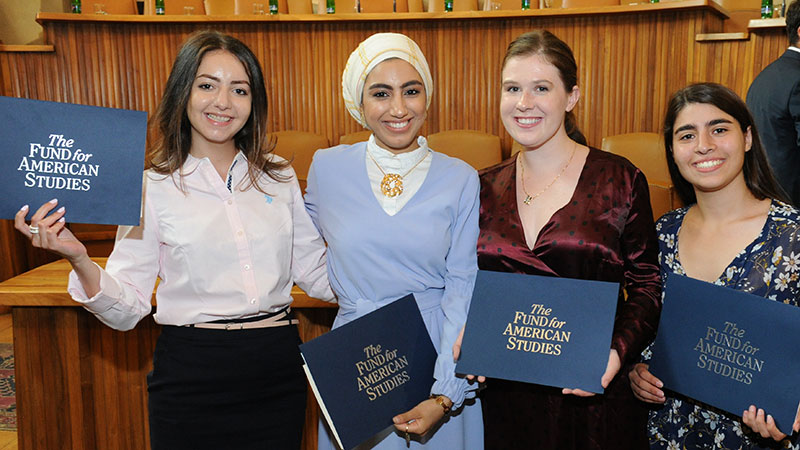
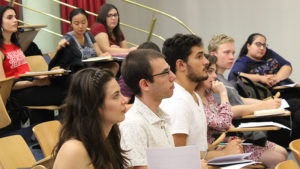
In 1993, TFAS established its first international program, bringing the ideas of economic liberty and free societies to the young people of Europe who had grown up behind the Iron Curtain. Now a quarter century later, TFAS continues to bring these important ideas to the region, providing an environment where free thought, open debate and conflict management can flourish.
On July 7, TFAS welcomed 100 young leaders from 37 countries to the 25th Annual American Institute on Political and Economic Systems (AIPES) in Prague, Czech Republic.
We, as participants, met each other to inspire positive change, not only in our own societies, but also – and I really believe – in the entire world.” – Inessa Manukyan (AIPES 18)
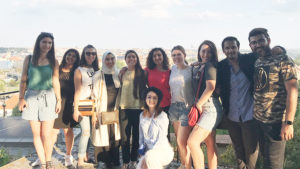
The comprehensive three-week program combined classes for credit through TFAS academic partner Charles University, guest lectures, cultural events and social activities. Bringing together 100 young leaders from varying backgrounds, countries, cultures and political ideologies, the TFAS program in Prague was the perfect opportunity for the students to explore significant ideas while sharing new experiences that supported their educational and professional development.
Inessa Manukyan (AIPES 18), a recent graduate of the American University of Armenia and member relations and knowledge sharing lead at The American Chamber of Commerce in Armenia, was one of the many participants positively impacted by the TFAS experience in Prague. She expressed that applying to the program was one of the best decisions of her life because it gave her the opportunity to learn new ideas and connect with peer leaders from around the globe.
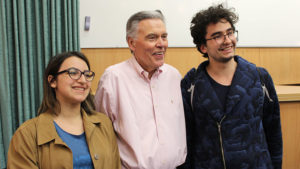
“I really believe that AIPES is the best international and multicultural program because it creates a platform where all stereotypes and interstate conflicts are put aside,” she said. “We, as participants, met each other to inspire positive change, not only in our own societies, but also – and I really believe – in the entire world.”
This positive change sprung from the new ideas she learned and new experiences she gained in the TFAS classroom. The course – team-taught by returning TFAS professors Dr. Michael Collins of Georgetown University; Dr. Joshua Mitchell of Georgetown University; Dr. Ibrahim Al-Marashi of California State University, San Marcos; and Dr. Adam Martin of Texas Tech University – covered fundamental ideas in political philosophy, conflict management and political economy.
During the course, Dr. Michael Collins led the class with his examination of “The Good Society,” a lecture series Dr. Collins has taught since the program first began, as a way to introduce the fundamental ideas of free societies to the class.
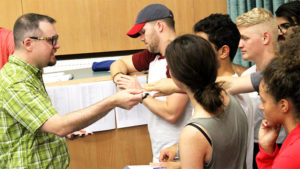
“I believe the value of the program resides in two interrelated features,” Collins said. “First, it asks students to reflect on a variety of important ideas so that they might come to understand what they believe politically and ethically, and second, it brings together young men and women from a variety of nations and ethnicities to discover what they share as citizens of the world.”
This component of the curriculum introduced Manukyan to one of the most important ideas she learned at TFAS: that freedom is an inherent right.
“Dr. Collins taught us that every human being has freedom, whether or not he or she has liberty. This was very deep ideology that we studied: that every human being has a free mind and no one can take it from him.”
This was very deep ideology that we studied: That every human being has a free mind and no one can take it from him.” – Inessa Manukyan (AIPES 18)
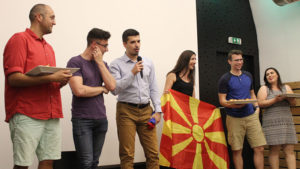
Manukyan took these powerful concepts she learned in Dr. Collins’ “The Good Society” lectures and applied them to other aspects of the TFAS program, like Dr. Ibrahim Al-Marashi’s conflict management class. This component of the curriculum provided a platform to discuss historical and current conflicts, and to think critically about how the students might someday play a role in conflict resolutions.
“In Dr. Al-Marashi’s class we learned that everything is in our hands,”Manukyan said. “We should have the courage and confidence not to repeat the conflicts of history, and to create a better world to live in for the future.”
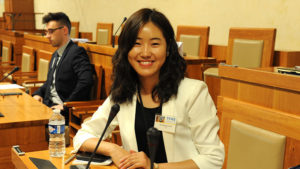
To supplement the lessons taught in the TFAS classroom, six guest lecturers spoke to students sharing their wealth of experience in business, academics and governments. These guests included The Honorable Pavol Demes, former minister of international relations of the Slovak Republic and civil society activist; TFAS Vice Chairman International William Hybl of The El Pomar Foundation; David Jackson, former TIME reporter and journalist at the Department of Defense; Adam Hradilek of The Institute for the Study of Totalitarian Regimes; TFAS alumnus Jakub Janda (AIPES 13) of the European Values Think Tank and Kremlin Watch; and TFAS alumnus Vladimir Vaňo (AIPES 99) of the CentralNIC Group, PLC.
In addition to their courses and guest lectures, the students experienced the history and beauty of Europe through various social activities and class exercises. The students embarked on tours of historical areas like the Old Town Square, day trips to Terezin Concentration Camp and Vienna, Austria, and participated in the annual Conflict Management Simulation at the Czech Parliament in Prague.
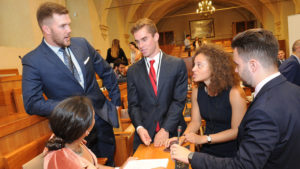
Held in conjunction with the conflict management coursework, the simulation allowed the students to create a dialogue as representatives from countries with severe conflict and come to a mutual understanding on key issues facing the world.
Manukyan shared that this exercise showed her there are paths to resolving conflict and creating change in the future.
“I felt very honored and proud that we could do this because it can get very emotional when you have different opinions that come from history, but AIPES once again proved that this is a platform where you are welcome to create a dialogue and try to solve conflicts that come from deep historical roots,” she said.
The students also embraced each other’s cultures through the annual Cultural Presentation Night, which takes place in each of the TFAS International programs. During this highlight event, students shared their cultures with fellow participants through song, dance, cuisine, language and traditional wardrobe presentations.
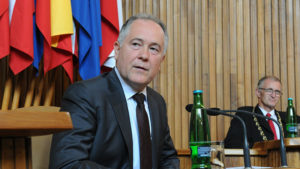
“One of the most amazing cultural events we had was the Cultural Presentation Night,” Manukyan said. “This event allowed us to break any kind of stereotypes and exposed us to diversity and new cultures. I could see how interesting and beautiful every culture truly is.”
Following a fast-paced three weeks of exploring and embracing new ideas in Prague, the 2018 American Institute on Political and Economic Systems (AIPES) class graduated into the more than 17,000-strong TFAS Alumni Network at a Closing Ceremony at the Charles University Carolinum on July 30. More than 30 TFAS alumni who were in town for the 25th Anniversary TFAS International Reunion attended the ceremony to celebrate the student’s accomplishments and look back on their TFAS Journeys.
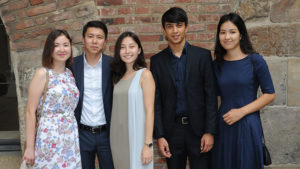
TFAS alumna Ieva Unzena (AIPES 99) of Latvia said that returning to Prague with TFAS was a unique experience.
“To see the professors, reunite with my classmates and meet students from other years allows me to look back on the special memories,” she said. “It’s recharging for the future and it’s always a chance to learn something new.”
During the ceremony, TFAS was honored to present The Honorable Pavol Demes with the 2018 AIPES Freedom Award. Demes, who also served as the keynote speaker for the ceremony, addressed the guests on the historical importance of 1918 when the Czechoslovak First Republic emerged from the collapse of the Austro-Hungarian Empire.
To learn more about the American Institute on Political and Economic Systems (AIPES) and all TFAS International Programs, visit TFAS.org/IntlPrograms.

